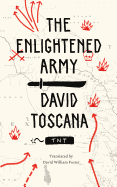
Early in Mexican author David Toscana's The Enlightened Army, a friend of the protagonist Ignacio Matus asks him to "just promise me that this adventure is for the fatherland, and not revenge for the medal the gringos stole from you." Matus, a history teacher, still grieves the outcome of the Mexican-American War--in 1848--and his "adventure" is to lead a group of pubescent students from Mexico into Texas to reconquer the Alamo. The medal refers to an Olympic bronze that Matus believes he deserved--he staged his own race simultaneously with the one held in Paris in 1928 and achieved a time faster than the gringo who placed third.
Initially, in this highly entertaining farce, Matus does not intend to recruit schoolchildren, but then he is fired for being overly patriotic and fails in his attempt to raise an army of loyal citizens from Monterrey. A boy who lives with him continues his cause and finds support among the highly imaginative and overly romantic students from the institute the boy attends.
"Ubaldo [a student soldier] says he was fascinated by the priest's story about the body that dies and releases an invisible puff of smoke that flies up to a place of blue clouds and happy faces where it will live forever. Didn't you see he was serious? That priest needs to be sent to the institute." Toscana's recounting of the army's journey ably mocks the delusions of nationalism, egotism and religion that so often lead humans to folly. --Evan M. Anderson, collection development librarian, Kirkendall Public Library, Ankeny, Iowa

